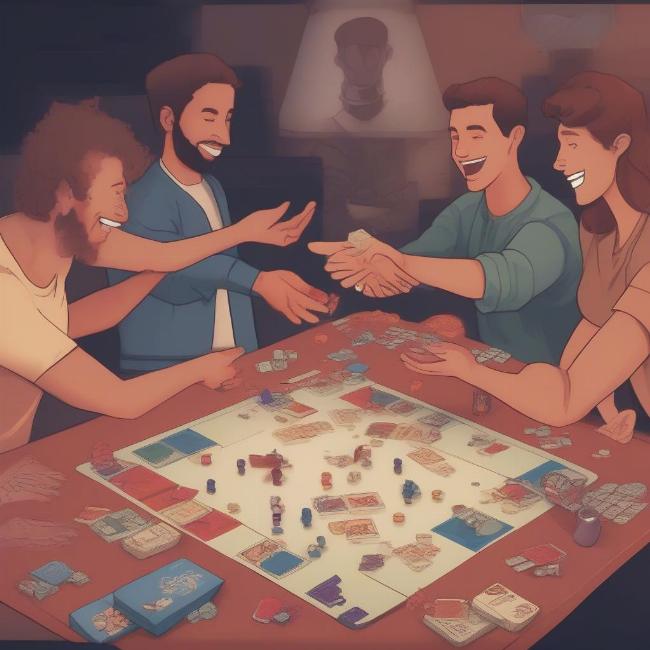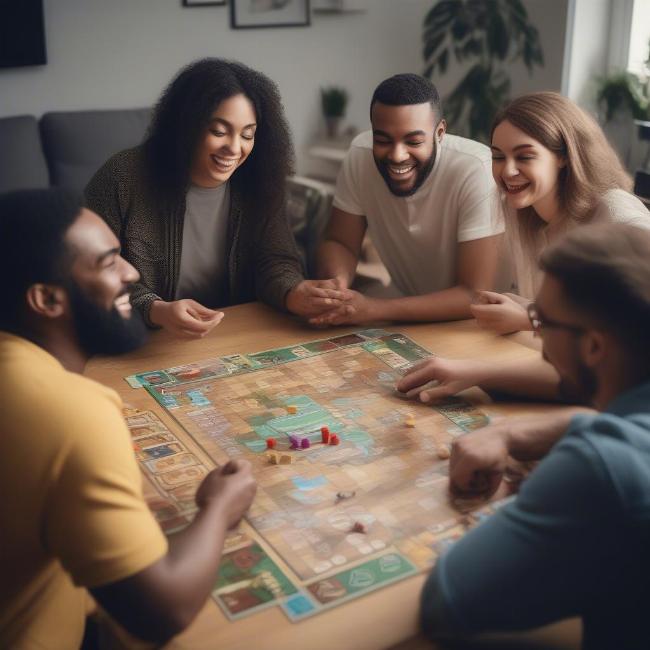Knowing How To End A Game is just as crucial as knowing how to start one. Whether it’s a board game night with friends, a competitive esports match, or a sprawling video game adventure, a satisfying conclusion is key to a positive overall experience. This article will explore the various facets of ending a game, from the practicalities of rule sets to the emotional impact of narrative closure.
 Kết thúc trò chơi đúng cách: Hướng dẫn chi tiết
Kết thúc trò chơi đúng cách: Hướng dẫn chi tiết
Understanding the “End Game” in Different Contexts
“How to end a game” can mean different things depending on the context. For a board game, it might involve reaching a certain score or completing a specific objective. In video games, it could entail defeating a final boss, solving a complex puzzle, or making a difficult choice that shapes the narrative’s resolution. Even in informal games, like a pick-up basketball game, there’s an understood method of concluding the activity, whether it’s reaching a predetermined score or simply running out of time. Each type of game has its own unique set of rules and conventions that dictate how it should end.
The Importance of Clear Rules and Conditions
Clear rules are essential for a smooth and satisfying conclusion. Ambiguity in how to end a game can lead to frustration, arguments, and a diminished sense of accomplishment. This is especially true in competitive settings, where the stakes are higher and the desire to win is strong. Imagine a thrilling game of Monopoly ending in a dispute over property ownership because the rules weren’t clearly understood. Or a video game’s climax falling flat due to a confusing or poorly designed final level. Clarity is key. Similar to how pokemon porn games have specific storylines and endings, understanding the rules and conditions is essential for a satisfying experience.
How to End a Game Gracefully: Etiquette and Sportsmanship
Knowing how to end a game isn’t just about following the rules; it’s also about sportsmanship and etiquette. Whether you win or lose, maintaining a positive attitude and respecting your fellow players contributes to a more enjoyable experience for everyone involved.
Handling Victory and Defeat
Winning a game is exhilarating, but it’s important to celebrate your victory with humility. Gloating or belittling your opponents can sour the experience for them and create unnecessary tension. Conversely, losing a game can be frustrating, but accepting defeat gracefully is a mark of good sportsmanship. Acknowledge your opponent’s skill, learn from your mistakes, and look forward to the next opportunity to play. Much like in fun fair games, winning and losing are part of the experience, and graciousness enhances the enjoyment for everyone.
 Tinh thần thể thao trong game: Thắng không kiêu, bại không nản
Tinh thần thể thao trong game: Thắng không kiêu, bại không nản
When to End a Game Early
Sometimes, circumstances necessitate ending a game prematurely. Perhaps a player needs to leave unexpectedly, or a disagreement arises that can’t be resolved. In these situations, it’s important to communicate openly and respectfully with everyone involved. Try to find a solution that’s fair to all parties, even if it means ending the game without a declared winner. Similar situations can arise even in seemingly straightforward games like those found on immortal games 3ds. Knowing when and how to end prematurely is crucial.
Crafting Compelling Endings in Video Games
In video games, the ending can be the culmination of dozens, even hundreds, of hours of gameplay. A well-crafted ending can elevate a good game to a truly memorable experience, while a poorly executed one can leave players feeling disappointed or even cheated.
The Power of Narrative Closure
Narrative closure is the sense of satisfaction and completeness that comes from a well-resolved story. In video games, this can be achieved through various means, such as a climactic battle with a compelling villain, a poignant cutscene that ties up loose ends, or a meaningful choice that allows the player to shape the protagonist’s destiny. Just as players look for a collection of good titles, as showcased in 100 game psp, they also seek satisfying narratives and conclusions in their gaming experiences.
The Role of Player Choice
Giving players agency in how the game ends can significantly enhance the feeling of immersion and emotional investment. This can involve choices that affect the game’s ending, multiple endings based on player actions, or even open-ended conclusions that allow players to interpret the narrative in their own way.
 Kết thúc game ấn tượng: Bí quyết tạo nên trải nghiệm đáng nhớ
Kết thúc game ấn tượng: Bí quyết tạo nên trải nghiệm đáng nhớ
How to End a Game: The Art of Leaving Players Wanting More
The ideal ending isn’t just satisfying; it also leaves players wanting more. This can be achieved through post-game content, hints at a sequel, or simply a compelling narrative that sparks discussion and speculation. This desire for more is a testament to a truly engaging and well-crafted game. Similar to the engaging gameplay of y8ben10 alien force games, a good game keeps players invested and wanting to explore further.
Conclusion
Knowing how to end a game is a multifaceted skill that goes beyond simply following the rules. It encompasses sportsmanship, clear communication, and, in the case of video games, the art of crafting a compelling and emotionally resonant narrative. Whether you’re playing a board game with friends or immersed in a virtual world, a well-executed ending can elevate the entire experience and leave a lasting positive impression.
FAQ
-
What’s the most important aspect of ending a game?
Clarity and adherence to the rules. -
How can I be a good sport when I lose a game?
Acknowledge your opponent’s skill and avoid making excuses. -
What makes a video game ending truly memorable?
A combination of narrative closure, player choice, and emotional impact. -
Why is it important to communicate when ending a game early?
To ensure fairness and avoid misunderstandings. -
How can a game leave players wanting more?
Through post-game content, hints at a sequel, or a thought-provoking narrative. -
What is the role of player agency in a game’s ending?
It increases player immersion and emotional investment in the outcome. -
How do clear rules contribute to a satisfying game ending?
They prevent disputes and ensure a fair and predictable conclusion.
